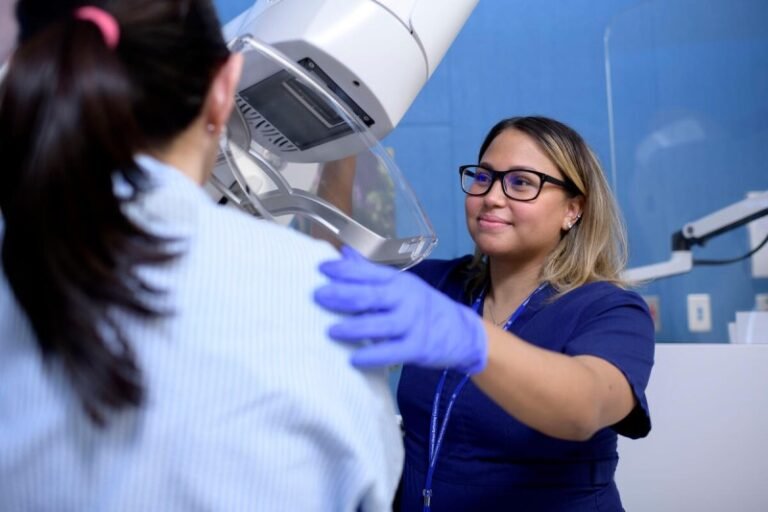Finding a lump in your breast can be alarming, but it’s important to remember that not all breast lumps are cancerous. In fact, many breast lumps are benign (non-cancerous) and can be managed without invasive treatments. However, getting any lump checked by a medical professional is crucial to rule out serious conditions. Facilities like Spital Clinic and NHS offer diagnostic services, including breast ultrasounds, to help identify the nature of these lumps quickly and accurately.
Common Types of Benign Breast Lumps
- Cysts
Breast cysts are fluid-filled sacs that often fluctuate in size and tenderness with menstrual cycles. While usually harmless, they can cause discomfort and may require drainage if they become too large. Breast ultrasounds are particularly effective in distinguishing cysts from solid lumps, making them a key tool for diagnosis. - Fibroadenomas
These are clumps of fibrous and glandular tissue that form a solid, benign mass. Fibroadenomas are more common in younger women and are often mobile and firm to the touch. Ultrasounds can detect the characteristic smooth and oval shape of fibroadenomas, which helps differentiate them from potentially cancerous masses. - Pseudoangiomatous Stromal Hyperplasia (PASH)
PASH is an overgrowth of connective tissue in the breast. While it rarely causes symptoms, it can feel like a lump or appear on imaging studies. PASH does not require treatment unless it causes discomfort or grows significantly. - Fat Necrosis
This condition occurs when fatty breast tissue is damaged, often due to trauma or surgery. Fat necrosis can feel like a firm lump and may mimic the appearance of a more serious condition. Diagnostic imaging, such as breast ultrasound and mammography, is essential to confirm its benign nature. - Lumpy or Dense Breast Tissue
In some cases, what feels like a lump may simply be dense or lumpy breast tissue. Women with dense breasts may benefit from additional imaging like ultrasounds, which can provide clearer insights than standard mammograms. - Reactive Lymph NodesOccasionally, lumps under the armpit are caused by swollen lymph nodes, which may react to infections, vaccinations, or other factors. While these are usually benign, it’s essential to have them evaluated to rule out any underlying conditions.
Why Diagnostic Imaging is Important
A physical exam alone cannot reliably differentiate between benign and cancerous lumps. Diagnostic imaging—such as mammograms and ultrasounds—is a cornerstone of breast health evaluation. Breast ultrasounds, in particular, are invaluable for identifying the structure of a lump, distinguishing between fluid-filled cysts and solid masses. At Spital Clinic, highly trained sonographers use state-of-the-art ultrasound technology to provide accurate assessments and peace of mind.
When to Seek Medical Advice
Any new breast lump should prompt a visit to a healthcare provider, regardless of size, mobility, or tenderness. Symptoms that warrant immediate attention include:
- Changes in the size or shape of a lump
- Persistent pain or discomfort
- Skin changes, such as dimpling or redness
- Nipple discharge or inversion
Even if you’ve recently had a negative mammogram, new symptoms should be evaluated promptly.
The Importance of Regular Breast Exams
Regular breast self-examinations and professional screenings are essential for early detection. Women are encouraged to familiarize themselves with the normal look and feel of their breasts, as this helps identify changes more easily. Monthly self-checks, especially a week after menstruation begins, are a good practice for premenopausal women. For postmenopausal women, a consistent monthly date works well.
Screening recommendations generally include:
- Annual mammograms starting at age 40
- Earlier and more frequent screenings for women with a family history of breast cancer or other risk factors
- Supplementary imaging, such as ultrasounds or MRIs, for those with dense breast tissue
Breast Health Services at Spital Clinic
Spital Clinic provides comprehensive diagnostic imaging services, including breast ultrasounds, to evaluate lumps and other breast changes. Their team of specialists works closely with patients to ensure timely and accurate assessments. While not every lump requires intervention, early evaluation is key to preventing complications and maintaining peace of mind.
Conclusion
Discovering a breast lump can be stressful, but it’s important to remain calm and proactive. Most lumps are benign and can be easily managed with the right care. Diagnostic imaging, such as mammograms and breast ultrasounds, plays a vital role in evaluating breast health and providing clarity. Facilities like Spital Clinic are well-equipped to support women through this process, offering expert evaluations and a compassionate approach to care.
By staying vigilant with regular screenings and seeking prompt medical advice for any changes, you can take charge of your breast health and ensure the best possible outcomes.
